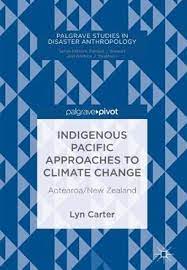Indigenous Pacific Approaches to Climate Change : Aotearoa New Zealand
- Unit price
- / per
-
Author:CARTER Lyn
-
ISBN:9783319964386
-
Publication Date:August 2018
-
Edition:1
-
Pages:106
-
Binding:Hardback
-
Publisher:Palgrave-Springer
-
Country of Publication:The Netherlands


A Back Order button means that we don’t have the book in stock at our store. It may already be on order – or we can order it for you from a publisher or distributor at no additional cost.
As we source items from around the globe, a back-order can take anywhere from 5 days to several weeks to arrive, depending on the title.
To check how long this might take, you’re welcome to contact us and we can provide an ETA or any other information you need. We recommend checking the timeframe before committing to an online order.
Indigenous Pacific Approaches to Climate Change : Aotearoa New Zealand
- Unit price
- / per
-
Author:CARTER Lyn
-
ISBN:9783319964386
-
Publication Date:August 2018
-
Edition:1
-
Pages:106
-
Binding:Hardback
-
Publisher:Palgrave-Springer
-
Country of Publication:The Netherlands
Description
Situating Maori Ecological Knowledge (MEK) within traditional environmental knowledge (TEK) frameworks, this book recognizes that indigenous ecological knowledge contributes to our understanding of how we live in our world (our world views), and in turn, the ways in which humans adapt to climate change. As an industrialized nation, Aotearoa/New Zealand (A/NZ) has responsibilities and obligations to other Pacific dwellers, including its indigenous populations. In this context, this book seeks to discuss how A/NZ can benefit from the wider Pacific strategies already in place; how to meet its global obligations to reducing GHG; and how A/NZ can utilize MEK to achieve substantial inroads into adaptation strategies and practices. In all respects, Maori tribal groups here are well-placed to be key players in adaptation strategies, policies, and practices that are referenced through Maori/Iwi traditional knowledge.
Lyn Carter is Senior Lecturer in Te Tumu (the School of Maori, Pacific and Indigenous Studies) at the University of Otago, New Zealand.
Adding product to your cart
You may also like
A Back Order button means that we don’t have the book in stock at our store. It may already be on order – or we can order it for you from a publisher or distributor at no additional cost.
As we source items from around the globe, a back-order can take anywhere from 5 days to several weeks to arrive, depending on the title.
To check how long this might take, you’re welcome to contact us and we can provide an ETA or any other information you need. We recommend checking the timeframe before committing to an online order.
You may also like
You may also like
-
Situating Maori Ecological Knowledge (MEK) within traditional environmental knowledge (TEK) frameworks, this book recognizes that indigenous ecological knowledge contributes to our understanding of how we live in our world (our world views), and in turn, the ways in which humans adapt to climate change. As an industrialized nation, Aotearoa/New Zealand (A/NZ) has responsibilities and obligations to other Pacific dwellers, including its indigenous populations. In this context, this book seeks to discuss how A/NZ can benefit from the wider Pacific strategies already in place; how to meet its global obligations to reducing GHG; and how A/NZ can utilize MEK to achieve substantial inroads into adaptation strategies and practices. In all respects, Maori tribal groups here are well-placed to be key players in adaptation strategies, policies, and practices that are referenced through Maori/Iwi traditional knowledge.
Lyn Carter is Senior Lecturer in Te Tumu (the School of Maori, Pacific and Indigenous Studies) at the University of Otago, New Zealand.
-
-
Author: CARTER LynISBN: 9783319964386Publication Date: August 2018Edition: 1Pages: 106Binding: HardbackPublisher: Palgrave-SpringerCountry of Publication: The Netherlands
Situating Maori Ecological Knowledge (MEK) within traditional environmental knowledge (TEK) frameworks, this book recognizes that indigenous ecological knowledge contributes to our understanding of how we live in our world (our world views), and in turn, the ways in which humans adapt to climate change. As an industrialized nation, Aotearoa/New Zealand (A/NZ) has responsibilities and obligations to other Pacific dwellers, including its indigenous populations. In this context, this book seeks to discuss how A/NZ can benefit from the wider Pacific strategies already in place; how to meet its global obligations to reducing GHG; and how A/NZ can utilize MEK to achieve substantial inroads into adaptation strategies and practices. In all respects, Maori tribal groups here are well-placed to be key players in adaptation strategies, policies, and practices that are referenced through Maori/Iwi traditional knowledge.
Lyn Carter is Senior Lecturer in Te Tumu (the School of Maori, Pacific and Indigenous Studies) at the University of Otago, New Zealand.
-
Author: CARTER LynISBN: 9783319964386Publication Date: August 2018Edition: 1Pages: 106Binding: HardbackPublisher: Palgrave-SpringerCountry of Publication: The Netherlands
-



